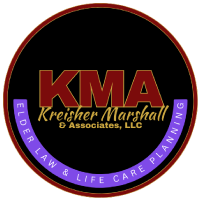Making Estate Planning Easy In Columbia County
Estate planning can be a difficult subject to approach or talk about. Many people do not enjoy entertaining the thought that they will not be around to spend time with and help their loved ones. When drawing up an estate plan, you’re essentially arranging for your own care and for the eventual distribution of your assets to your loved ones. You get to decide who receives the authority to carry out your financial and health care wishes if you’re unable to do so.
Preparing for the future and protecting your family’s well-being can seem overwhelming, but with the help of an experienced Bloomsburg certified elder law attorney at Kreisher Marshall & Associates, LLC, you can settle these affairs without stress or confusion – and at an affordable flat rate. We help all kinds of people – single and married, rich and modest alike – create customized estate plans that meet their needs and leave no stone unturned.
Why Is Estate Planning So Important?
Because you never know what might occur, and it’s always a good idea to have your wishes made clear on paper just in case. Because you want to maintain control of the things dearest to you, even when you’re not around. Because you want to reduce the amount of taxes your heirs will have to pay. Because you don’t want someone else to determine what happens to you, your family and your assets.
Wills: A Blueprint For Your Wishes
The most basic estate planning document is a “last will and testament.” A will outlines your wishes for how certain things should be handled after your death. Here are some key reasons why having a will is essential:
- Asset distribution: A will lets you specifically direct how your assets, including real estate, financial accounts and personal belongings, will be divided after your death. Without a will, state laws (intestacy laws) will determine the distribution, leading to outcomes that may not match up with your wishes.
- Guardianship for minors: If you are a parent with minor children, a will provides the opportunity to designate a preferred guardian should you die before your children are grown. This gives the court critical guidance.
- Appointment of an executor: Your executor is the person responsible for managing your estate’s distribution. Your will allows you to select someone you trust for the role.
Wills are a starting point upon which your estate plan can be built.
Trusts: A Protective Framework For Your Legacy
Trusts have become increasingly popular for estates of all sizes, and they can complement the estate planning process by offering benefits that a will does not have, such as:
- Probate avoidance: One of the primary benefits of trusts is that they can help bypass probate altogether. Probate can be costly and time-consuming for your beneficiaries, and trusts enable a more efficient transfer of assets.
- Privacy: Unlike wills, which become public documents during probate, trusts allow for a more private transfer of assets. This can be appealing to those who prefer to keep their family’s financials confidential.
- Incapacity planning: Trusts can be structured to provide for the management of assets in the event of the grantor’s incapacity. If you are incapacitated before your death, this can negate the need for court intervention.
- Flexibility in asset management: Trusts offer greater flexibility in the way assets are handled. They can be customized to address specific needs, such as staggered distributions for beneficiaries or the creation of charitable foundations.
In short, trusts can help you achieve a broad variety of goals and protect your family’s generational wealth.
Customize Your Estate Plan To Fit Your Life
Proper estate planning is a complex process that should never be accomplished with fill-in-the-blank templates. When drawing up an estate plan, you have the power to plan who gets your property. If you do not, the Pennsylvania laws of intestacy will dictate how to handle your affairs. Through estate planning, you can also control the type of medical care you receive and choose someone you trust to act as your power of attorney. Through our custom estate plans, you can pass your assets to your family or friends, avoid taxes and save your surviving loved ones from stress. Interested in learning more? See our frequently asked questions.
Plan Your Future Today With An Estate Planning Lawyer
Let us empower you to make the best choices for you and your family by providing you with exceptional quality, personal legal services. To discuss your estate plan with one of our experienced Pennsylvania estate planning attorneys, call us today at 570-798-1084 or send us an email.


